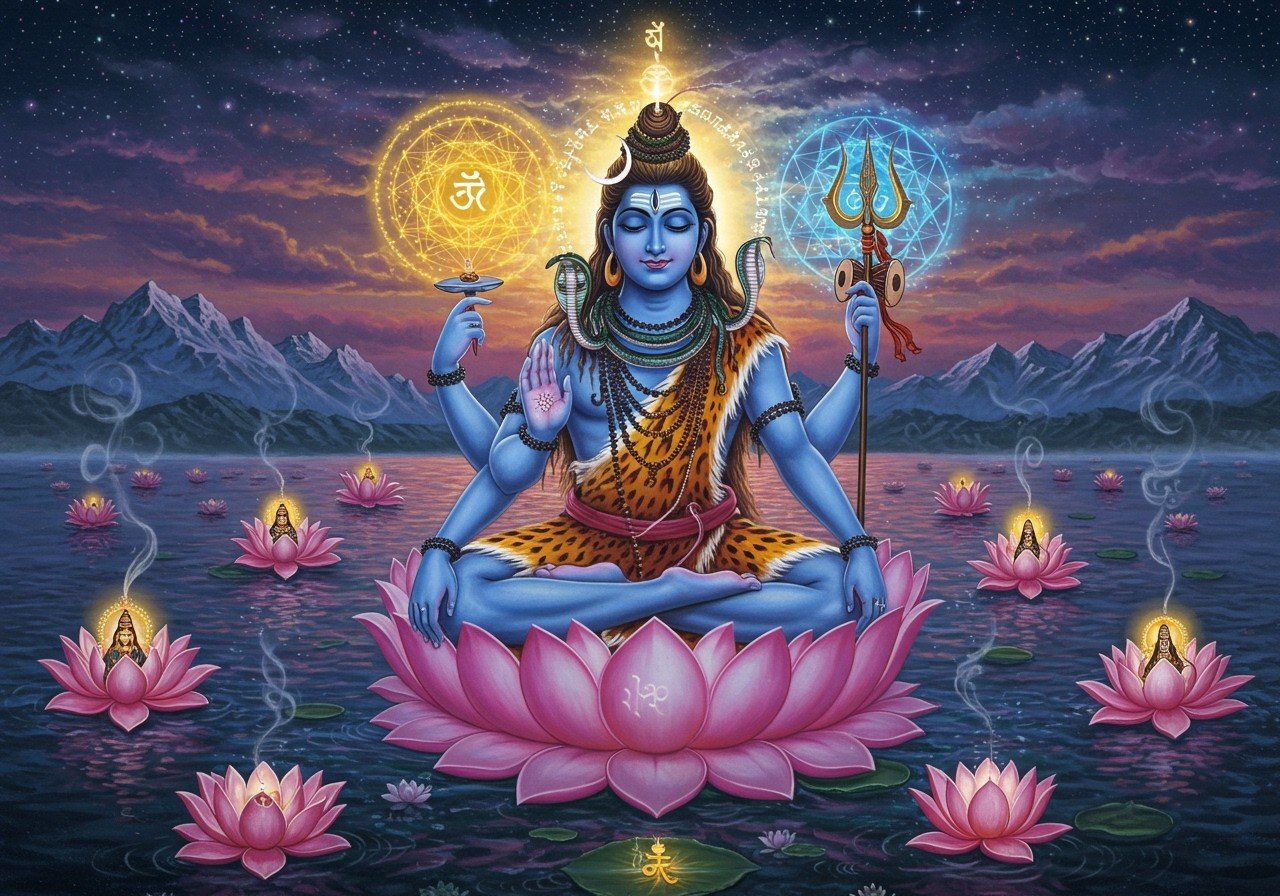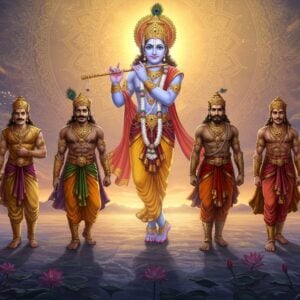
Trika Shaivism, a profound tradition within the broader Shaiva philosophy, offers a unique lens for understanding the divine. Rooted in the serene valleys of Kashmir, this tradition, also known as Non-dual Shaivism of Kashmir, has blossomed since around 850 CE, providing spiritual richness and insight for centuries. The term ‘Trika,’ meaning ‘triad,’ hints at its core principles, which resonate deeply with those who cherish their cultural heritage and seek profound spiritual experiences.
Core Principles of Trika Philosophy
Trika Shaivism perceives the universe as a manifestation of Shiva’s consciousness. At its heart lies the concept of Spanda, the divine vibration pulsating through all of existence. This dynamic energy is palpable in every aspect of creation. The principle of Abheda, or non-duality, teaches the fundamental oneness of the individual soul (Nara) and the universal consciousness (Shiva). It emphasizes that the separation we perceive is an illusion, and true liberation comes from realizing this unity. Shakti, Shiva’s dynamic energy or I-consciousness, represents the divine feminine, the active force that brings forth creation. Mala, often translated as ‘impurities,’ refers to the veils that obscure our true nature, preventing us from experiencing this oneness. Trika practices aim to gently lift these veils, revealing our inherent divinity. The Upāya, or paths to liberation, offer different approaches to this unveiling, with ‘Anupaya’ signifying the direct path of recognizing our inherent unity with Shiva.
Jnana (knowledge) and Ananda (bliss) are not just abstract concepts but integral aspects of the Trika path. These qualities are cultivated through practice, leading to a deeper understanding of ourselves and the universe. Through these core principles, Trika Shaivism provides a framework for not just understanding the divine, but also for experiencing it directly, leading to genuine spiritual growth.
The Threefold Nature of Shiva in Trika Shaivism
Trika Shaivism unveils a triadic understanding of Shiva, a concept beautifully encapsulated in its name, which means “threefold”. These three aspects—Shiva (God), Shakti (God’s energy or I-consciousness), and Nara (humanity)—form the very bedrock of its philosophy and practice. The tradition stresses their interconnectedness: they are not separate entities but facets of the same divine reality, each playing a crucial role in the cosmic dance.
- Paramashiva: The Transcendent Consciousness. This is the purest form of Shiva, representing pure consciousness, beyond all duality and limitations. It is the unchanging, eternal source of all that is. Think of it as the vast, silent backdrop against which the entire universe unfolds.
- Parashakti: The Dynamic Energy of Creation. Parashakti is the dynamic, creative energy that emanates from Paramashiva, giving birth to and sustaining the universe. It is the active force behind all transformation and the pulsating lifeblood of existence. It’s through this divine energy that the universe takes form and continues to evolve.
- Parameshvara: The Immanent Divinity. This is the aspect of Shiva that interacts with the world, the divine presence within creation. Parameshvara governs the cosmic order, ensuring balance and harmony. It is the aspect of Shiva that devotees can connect with personally, experiencing the divine in a tangible way. This personal connection deepens our relationship with the divine.
In Trika Shaivism, these three aspects aren’t separate entities but interconnected expressions of the same ultimate reality. While this echoes the trinity of Brahma, Vishnu, and Mahesh in other Hindu traditions, Trika uniquely emphasizes the non-dual nature of these aspects. This perspective reinforces the idea that all diversity ultimately stems from a single, unified source.
The Shiva Sutras and Their Significance in Trika Shaivism
The Shiva Sutras hold a revered position within Trika Shaivism. Attributed to the sage Vasugupta, these sacred verses serve as a foundational text, illuminating the path towards self-realization and spiritual awakening. They offer practical guidance for seekers, outlining techniques for meditation and deep inner exploration. More than just a philosophical treatise, the Shiva Sutras offer a roadmap for inner transformation.
Within the tradition, the Guru-disciple relationship plays a crucial role in transmitting these teachings. This sacred bond ensures the preservation and authentic understanding of these profound insights. Commentaries by esteemed scholars like Abhinavagupta further illuminate the meaning of the sutras, providing invaluable context and practical applications for daily life. These commentaries bridge the gap between ancient wisdom and contemporary living. The Shiva Sutras complement other key texts in the Trika canon, such as the Spanda Karikas and Vijnana Bhairava Tantra. Together, these scriptures form a comprehensive guide for spiritual seekers, offering a wealth of knowledge and practices for cultivating awareness and deepening one’s connection with the divine.
Trika Shaivism in the Modern World
Even today, Trika Shaivism continues to inspire and guide spiritual seekers across the globe. Its timeless teachings are being thoughtfully adapted to resonate with modern lifestyles, ensuring their relevance while preserving their authenticity. The digital age, with its online platforms and readily available resources, has played a significant role in making these teachings accessible to a wider audience. Practitioners from various backgrounds can now connect and share insights, fostering a global community of learning and growth.
Contemporary teachers play a vital role in carrying forward the Trika tradition. They offer guidance and support, helping seekers navigate their spiritual journeys with clarity and understanding. These teachings are often seamlessly integrated into yoga and meditation practices, enriching these disciplines with deeper meaning and transformative potential. While adapting ancient wisdom to modern contexts presents its own set of challenges, particularly in maintaining authenticity, the core principles of Trika Shaivism remain remarkably relevant. They provide a robust framework for exploring spirituality and reconnecting with one’s cultural heritage. The tradition’s adaptability shows its enduring power to guide seekers on their path.
Deepen your spiritual practice with Japa: Explore the power of repeating sacred names.
Poojn.in: Supporting Your Spiritual Journey
At poojn.in, we understand the importance of having authentic and readily available resources for your spiritual practices. As India’s leading Dashakarma bhandar, we offer a wide selection of items specifically curated for devotees of Lord Shiva and practitioners of Trika Shaivism. We aim to bridge the gap between tradition and accessibility.
Ritual Items for Shiva Worship:
- Pure copper and brass items for abhishekam, enhancing the sanctity of your rituals. Copper is known for its conductivity, enhancing the flow of energy during sacred rituals. We offer a wide variety of copper vessels and other items, ensuring you have the perfect tools for your practice.
- Traditional rudraksha malas in various mukhi options, each carrying its unique significance. Rudraksha beads are revered for their spiritual properties and are believed to enhance focus and connection with the divine. Choose from our diverse collection to find the perfect mala for your needs.
- Authentic vibhuti (sacred ash) from certified sources. Vibhuti, symbolic of purification and transformation, is an essential element in Shiva worship. We source our vibhuti from trusted sources, guaranteeing its purity and authenticity.
- Crystal and natural stone Shiva lingams for your personal altar or shrine. Shiva lingams represent the divine energy of Lord Shiva and are central to many worship practices. Our collection features lingams crafted from various natural materials, allowing you to choose the one that resonates most deeply with you.
- Specially crafted puja thalis for Shiva worship, containing all the essential components for a complete and reverent offering. A well-prepared puja thali demonstrates respect and devotion. We offer a range of thalis to suit different preferences and needs, making it easier to perform your puja with utmost reverence.
Festival Essentials:
- Complete puja kits for Maha Shivaratri, making it convenient to observe this important festival with all the necessary items. Maha Shivaratri is a night of profound spiritual significance. Our puja kits ensure you have everything you need to observe this sacred occasion with devotion and reverence.
- Special items for Shravan month observances, facilitating your devotion during this holy period. Shravan month is dedicated to Lord Shiva and is a time of intensified spiritual practice. Our curated selection of items supports your observances and deepens your connection with the divine during this auspicious time.
- Bilva leaves and other sacred offerings essential for traditional Shiva puja. Bilva leaves hold a special significance in Shiva worship. We ensure the availability of fresh and high-quality bilva leaves, along with other essential offerings, so you can perform your puja with complete reverence.
For personalized guidance in selecting the ideal items for your Shaivite practices, our team is here to assist you:
- Phone: 03369029784
- WhatsApp: 9476142738
We take pride in offering high-quality products, ensuring they are packaged respectfully to maintain their sanctity. We provide secure and reliable delivery throughout India, handling all sacred items with the utmost care and reverence.
Shop now at Poojn.in for authentic Shaivite worship materials.
Embracing the Timeless Wisdom: A Path to Self-Realization
Trika Shaivism unveils a profound understanding of Shiva’s nature and illuminates the path to self-realization. By embracing the threefold essence of Paramashiva, Parashakti, and Parameshvara, we connect with the ultimate reality in its most complete expression. The Shiva Sutras, along with other sacred texts, serve as guiding lights, offering wisdom that transcends time and resonates deeply within us. In our modern world, as many seek spiritual depth and meaning, Trika Shaivism shines as a timeless beacon. It gracefully bridges the gap between ancient teachings and contemporary life. By honoring tradition while adapting to modern contexts, this path allows practitioners to maintain a living connection with their spiritual heritage. The essence of this journey lies in preserving authenticity, staying true to the core principles that have guided spiritual seekers for generations.
Exploring Trika Shaivism is not just an intellectual exercise; it’s an invitation to embark on a transformative journey. It’s a path that honors our cultural roots while providing the clarity and understanding that comes with modern perspectives. This delicate balance nurtures a rich spiritual inheritance, allowing us to deepen our connection with both the divine and our own inner selves. By walking this path, we pay homage to the wisdom of our ancestors, carrying its light forward into the future.
FAQs: Unveiling the Essence of Trika Shaivism
What are the core principles of Trika philosophy? Trika philosophy revolves around the essential unity of the individual soul with the universal consciousness. It emphasizes recognizing the divine within ourselves and in every aspect of creation. It is about experiencing interconnectedness as a living reality, not just a philosophical concept.
How does Trika Shaivism view the three aspects of Shiva? Trika Shaivism presents Shiva as a trinity: Paramashiva (the transcendent source), Parashakti (the dynamic, creative energy), and Parameshvara (the immanent, interactive aspect). These three aspects are not separate but interwoven, explaining the cycle of creation, preservation, and transformation of the universe. They offer a holistic understanding of the divine’s role in the cosmos.
What is the relationship between Trika and the Shiva Sutras? The Shiva Sutras form the very foundation of Trika Shaivism. These sacred verses offer a practical guide to spiritual practice, unveiling the nature of consciousness and providing a framework for understanding Trika teachings. They are a source of profound wisdom and a guide for those seeking self-realization.
Why is Trika Shaivism important in understanding the nature of consciousness? Trika Shaivism provides a unique and insightful perspective on consciousness, emphasizing self-realization and the inherent interconnectedness of all beings. It offers tools for exploring the nature of reality and the workings of the mind, leading to deeper self-awareness and a more profound understanding of existence.
How does Trika Shaivism differ from other forms of Shaivism? Trika Shaivism stands out through its emphasis on the threefold nature of reality. It seamlessly integrates philosophical concepts with practical techniques for experiencing the divine, particularly through meditation and direct experience. This focus on practice makes it a living tradition, not just a theoretical framework.
What role does meditation play in Trika Shaivism? Meditation is the cornerstone of Trika practice, enabling practitioners to directly experience the unity of their individual consciousness with the universal consciousness. It serves as a powerful tool for self-discovery, inner transformation, and spiritual growth.
How can one practice Trika Shaivism in daily life? Trika Shaivism seamlessly integrates into daily life through practices like meditation, self-reflection, and recognizing the divine presence in every moment. It encourages mindful living, fostering an awareness of the interconnectedness of all things, leading to a deeper appreciation for the sacred in the ordinary.


